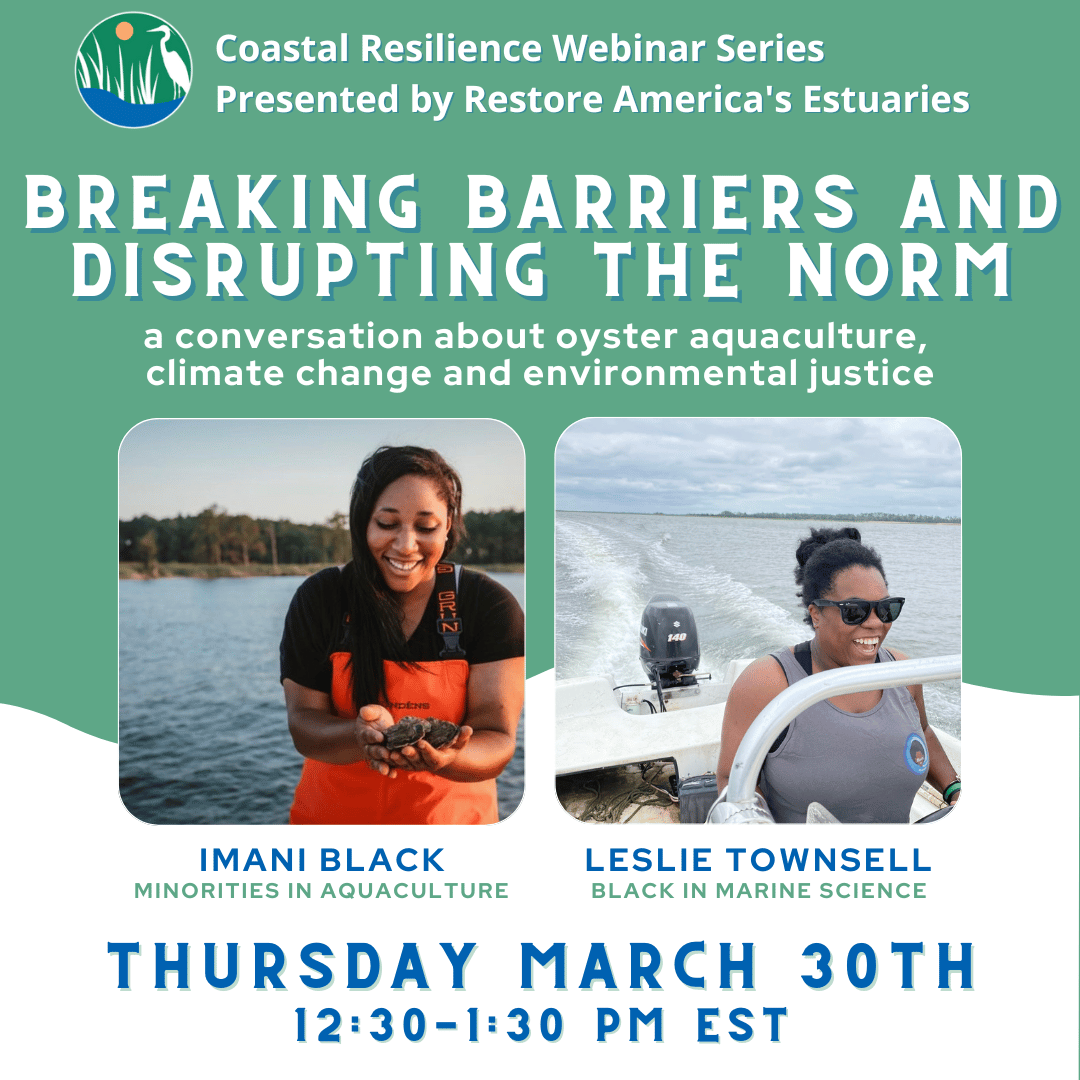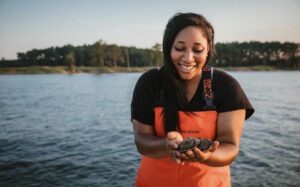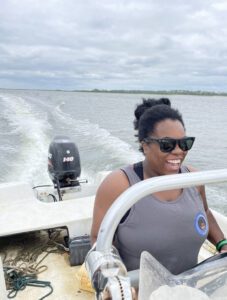
- This event has passed.
Breaking barriers and disrupting the norm: a conversation about oyster aquaculture, climate change, and environmental justice
March 30, 2023 @ 12:30 pm - 1:30 pm
Free
Panelists
 Imani Black – Imani Black was born and raised on the Eastern Shore of Maryland in Chestertown. She has always had a passion for restoration and conservation since she was a young girl and found great interest in the rapidly growing shellfish aquaculture industry, after completing an aquaculture training program at Virginia Institute of Marine Science in 2016. Since then, Imani has worked on oyster farms, nurseries and hatcheries along the Eastern Shore of Virginia and Maryland. From 2018 to 2020, she was the Assistant Hatchery Manager for Hoopers Island Oyster Company, having the opportunity to work in all aspects of shellfish growout. Through her love for her career, Imani founded Minorities In Aquaculture, a nonprofit organization that strives to empower and support the underrepresented demographics (i.e women of color, women in general, men of color, etc) in the aquaculture industry by providing opportunities such as paid internship, technical skills training and career development resources. Over the last 2 years, MIA has focused its efforts and resources toward supporting women of color in their aquaculture careers, starting with Imani’s demographic which is also least engaged in this space. Overall, Minorities In Aquaculture is recognized as an impactful network focused on sustainable seafood education, aquaculture workforce development, and active engagement approaches not only for the minorities in aquaculture, but the industry as a whole in its effort towards a more diverse aquaculture field. In addition to developing the nonprofit, Imani is also pursuing a Master’s degree at the University of Maryland’s Center for Environmental Science researching the historical coastal communities of color in commercial fisheries in the Chesapeake Bay, while highlighting the approaches and methods toward active minority engagement and participation in coastal regions.
Imani Black – Imani Black was born and raised on the Eastern Shore of Maryland in Chestertown. She has always had a passion for restoration and conservation since she was a young girl and found great interest in the rapidly growing shellfish aquaculture industry, after completing an aquaculture training program at Virginia Institute of Marine Science in 2016. Since then, Imani has worked on oyster farms, nurseries and hatcheries along the Eastern Shore of Virginia and Maryland. From 2018 to 2020, she was the Assistant Hatchery Manager for Hoopers Island Oyster Company, having the opportunity to work in all aspects of shellfish growout. Through her love for her career, Imani founded Minorities In Aquaculture, a nonprofit organization that strives to empower and support the underrepresented demographics (i.e women of color, women in general, men of color, etc) in the aquaculture industry by providing opportunities such as paid internship, technical skills training and career development resources. Over the last 2 years, MIA has focused its efforts and resources toward supporting women of color in their aquaculture careers, starting with Imani’s demographic which is also least engaged in this space. Overall, Minorities In Aquaculture is recognized as an impactful network focused on sustainable seafood education, aquaculture workforce development, and active engagement approaches not only for the minorities in aquaculture, but the industry as a whole in its effort towards a more diverse aquaculture field. In addition to developing the nonprofit, Imani is also pursuing a Master’s degree at the University of Maryland’s Center for Environmental Science researching the historical coastal communities of color in commercial fisheries in the Chesapeake Bay, while highlighting the approaches and methods toward active minority engagement and participation in coastal regions.
 Leslie Townsell – Leslie Townsell’s interest in Marine Science dates back to her childhood when her mother would take her to the maritime center in Connecticut and other aquariums during their travels. Her father, an avid swimmer, took it upon himself to instill his love of swimming in her. Her parents encouraged her love of water and her curiosity of marine life. She was afforded the opportunity of a lifetime when her family took her to the Great Barrier Reef in Australia. While snorkeling, she observed the complex and often mutualistic interactions of marine life. Upon learning that coral reef systems around the world were dying, her interest in marine conservation grew. When she was in high school, she had the opportunity to work with corals hands on.
Leslie Townsell – Leslie Townsell’s interest in Marine Science dates back to her childhood when her mother would take her to the maritime center in Connecticut and other aquariums during their travels. Her father, an avid swimmer, took it upon himself to instill his love of swimming in her. Her parents encouraged her love of water and her curiosity of marine life. She was afforded the opportunity of a lifetime when her family took her to the Great Barrier Reef in Australia. While snorkeling, she observed the complex and often mutualistic interactions of marine life. Upon learning that coral reef systems around the world were dying, her interest in marine conservation grew. When she was in high school, she had the opportunity to work with corals hands on.
During a semester-long project at Lovett, she researched the propagation of yellow polyp corals in an elective marine biology course. Her interest in pursuing a career in marine science was re-ignited. During this class, she also took a field trip where she observed marine research in action at Skidaway Island. Upon graduation she enrolled at Spelman College.
Leslie received her B.S. in Biology from Spelman College. During her final years at Spelman she completed an independent research project, and also volunteered at the Georgia Aquarium. She later completed her thesis research at The Georgia Institute of Technology and obtained her M.S. in Biology from Clark Atlanta University. After working for a few years, Leslie enrolled at the University of Georgia (UGA).
Currently, Leslie’s research in the department of Marine Science at UGA explores the impacts of climate change stressors on oysters and sharks looking specifically at the effects of high pH on oyster larvae and the seasonal distribution of Vibrio on shark microbiomes along the Georgia coast. Leslie’s goal is to increase the sustainability in Georgia’s coastal fisheries and aquaculture and promote healthy coastal ecosystems. While at UGA Leslie noticed the lack of Black scientists and wanted to do something about it.
Leslie is passionate about increasing diversity in marine science which she does through her leadership role in Black In Marine Science, a non-profit which promotes and amplifies the voices of Black Marine Scientist and shines a light on the lack of diversity in the field. She is also an active participant of the UGA, Department of Marine Science, Diversity, Equity and Inclusion (DEI) committee.
Growing up around strong women of color has empowered her to become a role model for other young women, especially those who might be apprehensive on entering the STEM field. She intends to break down barriers in her field and pave a way to make it a little easier for those black girls following in her footsteps. In her spare time, she enjoys swimming, SCUBA, (really anything involving water), traveling, and trying new foods!
Always remember when faced with adversity, “Just keep swimming!” –Dory, Finding Nemo
